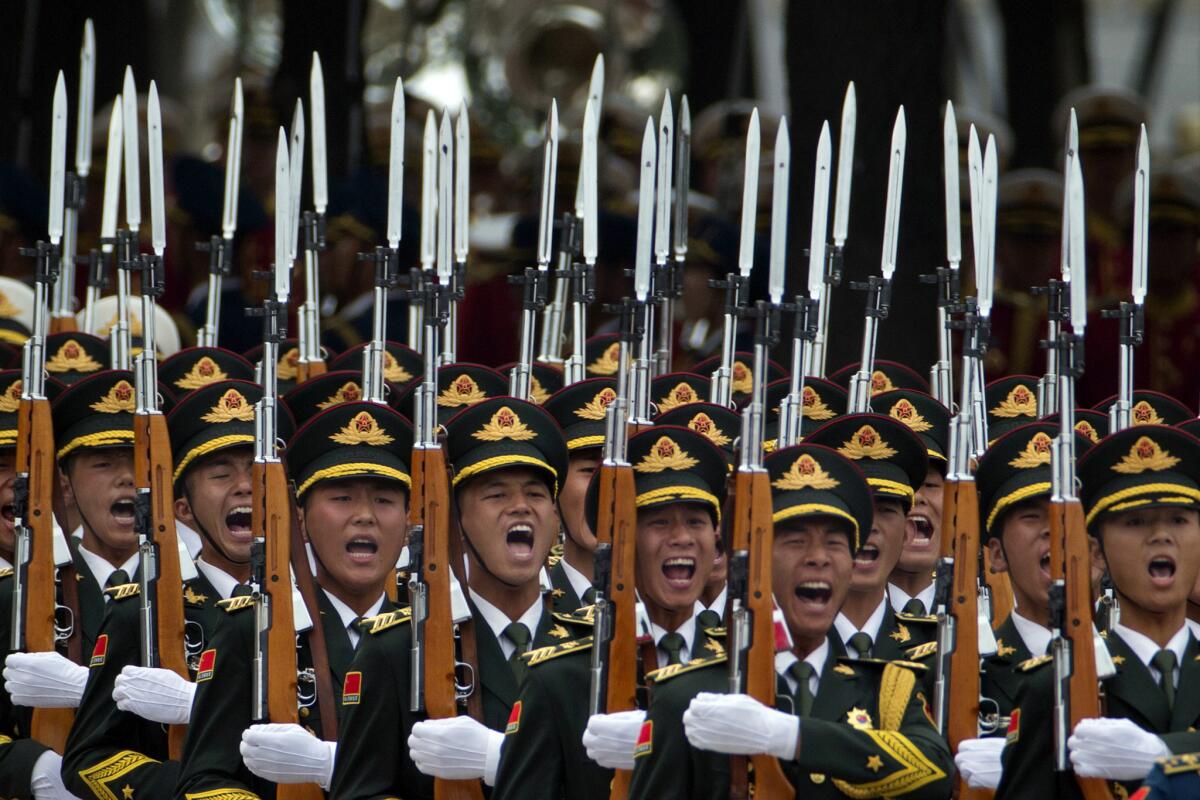China’s new national security law covers everything from space to cults

Members of a Chinese honor guard take part in a welcome ceremony for Belgium’s King Philippe in Beijing on June 23. China’s top legislature has adopted a sweeping new national security law touching on everything from the military and economy to religion and the Internet.
- Share via
Reporting from Beijing — China’s top legislature on Wednesday adopted a sweeping new national security law touching on everything from the military and economy to the environment, religion, the Internet, food safety and space exploration, saying the country needed to bolster legal measures in the face of “ever-growing security challenges.”
But critics fear the broadly worded law could be used to stifle dissent, reinforce censorship and impose new constraints on tech companies and other businesses.
The law is one of three pieces of legislation promulgated in recent months that aim to bolster China’s security – and strengthen ideological control over the public. (The other two concern counter-terrorism and regulations on foreign nongovernmental organizations.)
Wednesday marked the 94th anniversary of the Chinese Communist Party, and the national security law discusses the need for “firm ideological dominance” and “strengthening public opinion guidance” on matters of national security.
The law touches on a wide range of matters, from the need to punish “illegal cult activities” to China’s ambitions to explore outer space and polar regions.
Penalties for violations are not discussed, but the law defines national security as a state in which “a country’s government, sovereignty, unification, territorial integrity, well-being of its people, sustainable development of its economy and society, and other major interests are relatively safe and not subject to internal and external threats.” April 15 has been designated as “National Security Education Day.”
The legislation comes as party propaganda organs have ramped up messages warning against embracing “Western values” – while plastering Beijing and other major cities with banners and signs encouraging citizens to embrace “core socialist values” such as democracy, equality and rule of law.
The new national security law references the need for “carrying forth the exceptional culture of the Chinese nationality” and “defending and resisting against negative cultural infiltration.”
It places a particular emphasis on cybersecurity and the Internet, stressing the need to bolster the nation’s IT systems and network defenses and asserting “cyberspace sovereignty” over the Internet in China. Information systems and data in key sectors must be “secure and controllable,” it says.
The U.S. has accused China of conducting commercial espionage against American businesses and Chinese hackers are suspected in a recent major infiltration of U.S. government personnel databases. But China has categorically rejected such allegations and says it is a constant victim of cyberattacks itself.
The national security law and the other two pieces of related legislation have prompted expressions of concerns from business groups, journalist associations and other entities.
Last month, European Union Chamber of Commerce in China President Joerg Wuttke called the legislation “a massive national security overreach.” He said the texts’ “vagueness creates a great deal of uncertainty for business, as it implicitly leaves the Chinese government with the option of undermining foreign market access based on unclear and broad national security considerations.”
Zheng Shuna, of the National People’s Congress Standing Committee’s legislative affairs commission, rejected the notion that the legislation was overly broad. She said China welcomed “all countries’ businesses to operate in China and provide legitimate services according to law.”
“Any government will stand firm and not leave any room for disputes, compromises and interferences when it comes to protecting its core interests,” she added. “China is no exception.”
The Hong Kong Journalists Assn. said the legislation was a potential threat to the freedom of expression enjoyed by citizens of the semiautonomous former British colony that returned to Chinese rule in 1997, adding that it could step up pressure on the territory to adopt controversial anti-subversion legislation that was shelved several years ago amid public protests.
China’s National People’s Congress is a rubber-stamp body, and the national security legislation was passed almost unanimously. Legislators did invite public comment on the national security legislation, but a Hong Kong reporters’ group complained that the congress did not take into account feedback from human rights scholars and nongovernmental organizations, and was just “going through the motions.”
China has backed off of some the proposed legislation, however, amid fierce criticism. This spring, authorities proposed a law that would have forced tech companies working in the banking sector to provide encryption keys and passcodes to government security forces; the effort was dropped amid opposition from both foreign and domestic businesses.
Tommy Yang in The Times’ Beijing bureau contributed to this report.
Follow @JulieMakLAT for news from China
More to Read
Sign up for Essential California
The most important California stories and recommendations in your inbox every morning.
You may occasionally receive promotional content from the Los Angeles Times.











